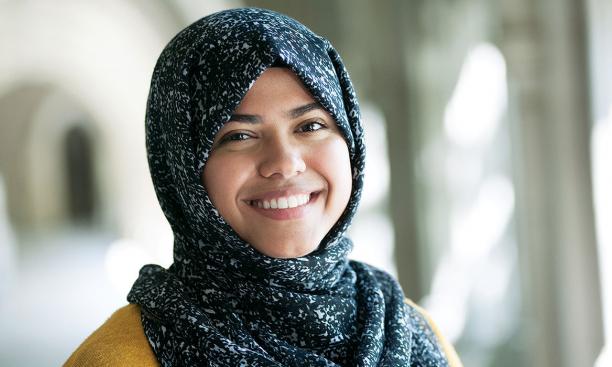
The celebratory receptions during Commencement provide a bounty of food and drink, but Nusrat Ahmed ’17, the graduating class’s new president, often could not partake of it. She did not eat or drink anything from sunrise to sunset in observation of the Muslim holy month of Ramadan.
Ahmed is believed to be the first Muslim class president at the University, and she said she is honored by the symbolism of the title. “It’s really exciting being the first anything, and I see the validity in labeling such things because it can set a precedent for other people,” she said.
Ahmed’s parents are immigrants from Bangladesh, and she grew up in the Bronx. She is proud of her background as a Muslim woman leader and as a first-generation and low-income student. “I feel like I can try my best to take into account different perspectives on campus,” she said.
A member of the Muslim Students Association, Ahmed said most of her closest friends were from that group, and Imam Sohaib Sultan, a Princeton chaplain, served as a “spiritual teacher and mentor.” Ahmed said she “loved” the way the University handled religion and interfaith work, noting that President Eisgruber ’83 attended a Friday-afternoon prayer service to ask what Princeton could do to help the Muslim community after the Trump administration proposed a travel ban affecting seven Muslim-majority countries.
While she always felt safe on campus, she said she is aware that her religion can sometimes define her. “Being a Muslim and wearing a headscarf, I don’t do anything completely autonomously,” she said. When she is in a public space, Ahmed said, “I am aware that everyone is watching me, and they’re watching me as someone who is wearing the headscarf.”
And that can be an opportunity, she said. Ahmed is grateful for the University’s financial support, and she has looked for ways to give back: involvement in student government, helping to found the Princeton Perspective Project — which challenged the concept of “effortless perfection” on campus — and mentoring younger students.
An anthropology major, Ahmed wrote her thesis on the definition of home for Bengali migrants in Singapore. After graduating, she began a three-month journalism fellowship in Turkey with the national public broadcaster, TRT World.
As class president, Ahmed said she knows the transition from college to the “real world” can be difficult, and class officers will work to keep the 2017 community together.
